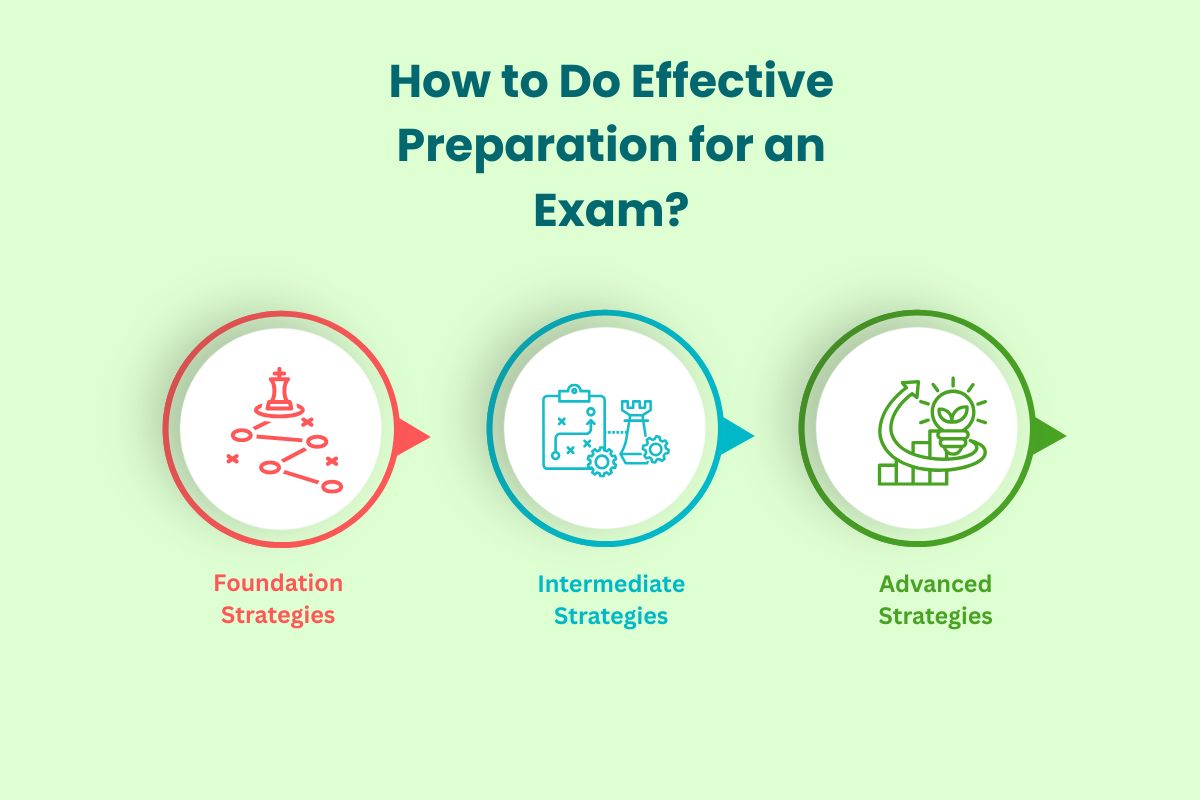What if the secret to conquering your biggest academic hurdles isn’t just about how much you study, but how you approach the challenge itself?
Just think about it, stepping into an exam room not with fear, but with a quiet confidence, knowing you’ve built a solid foundation. It’s an achievable reality when you shift your focus from simply forcing yourself to truly mastering the art of preparation.
The journey of preparing for your exams is less about distinctive brilliance and more about strategic planning and consistent effort. It’s about changing overwhelming deadlines into manageable milestones and turning broad subjects into focused learning objectives.
Better outcomes lie in understanding the dynamics of preparing for an exam and equipping yourself with the right tools and mindset.
Benefits of Preparing for an Exam:
Preparation for an exam is vital for several reasons, including reducing stress and anxiety, improving performance, and developing important skills like time management and self-discipline.
It allows students to better understand the material, practice test-taking strategies, and gain confidence in their abilities.
How to Do Effective Preparation for an Exam?

Not all students start from the same place, and that’s okay. We have made a breakdown for exam preparation into three practical layers so you can start where you are and improve your study game.
1. Foundation Strategies:
These tips are ideal for students new to planned studying or those looking to build a solid base.
> Start Early and Plan Strategically:
Preparing for an exam early is one of the smartest moves you can make. It gives you the breathing room to truly understand concepts rather than rushing through them the night before.
Instead of forcing, break your syllabus into manageable pieces and map out a realistic study schedule. Assign specific goals to each session, whether it’s mastering a chapter, solving a set of problems, or revising key notes.
> Organize Your Study Space:
To truly unlock your concentration, cultivate a dedicated, clutter-free study area. This isn’t just about tidiness; it’s about creating a mental space free from visual noise and nagging reminders of other tasks.
Combine this focused environment with a proactive approach to minimizing distractions: silence notifications, turn off unnecessary electronic devices, and let those around you know you need uninterrupted time.
> Utilize Active Learning Techniques:

Techniques like summarizing information in your own words force your brain to process and reconstruct concepts, solidifying understanding. Even more powerful is teaching concepts to others, as it exposes gaps in your knowledge and reinforces what you’ve learned.
And don’t underestimate the humble flashcard; this versatile tool, especially when used for active recall, significantly boosts memory retention and makes recovery during the exam almost second nature.
> Simulate Exam Conditions:
Stepping into the exam hall can feel like a high-stakes performance, but you can turn nerves into confidence by rehearsing.
Practicing with past papers or sample questions under timed conditions is your dress rehearsal, allowing you to familiarize yourself with the format and common question types and also to refine your pacing.
> Prioritize Well-being:
Beyond textbooks and notes, true exam readiness hinges on prioritizing your well-being. Plenty of sleep, healthful nutrition, and regular breaks aren’t luxuries; they’re essential pillars for maintaining sharp mental clarity and physical resilience.
Even light physical activity can significantly boost cognitive function, helping you retain information more effectively and approach your studies with renewed focus.
2. Intermediate Strategies:
These tips are for students with some experience to increase efficiency in preparing for an exam.
> Develop a Game Plan:
To maximize your study efficiency, begin by setting clear, specific objectives for every session, and know precisely what you aim to accomplish. Then, strategically allocate dedicated time blocks to different subjects or topics, ensuring comprehensive coverage and preventing burnout.
This focused approach transforms daunting tasks into achievable goals, building momentum and confidence with every study period.
>Predict Exam Questions:
Lift your exam strategy by becoming a question prediction expert. Dive into your lecture notes, readings, and past exams to spot repetitive themes and key concepts; this insight is gold for anticipating what examiners might ask.
Then, don’t just passively review; actively formulate and practice answering these predicted questions, refining your responses until they’re clear, concise, and compelling.
> Incorporate Technology Wisely:

Boost your exam preparation by leveraging powerful apps and online platforms for interactive quizzes and digital flashcards, transforming passive review into active recall. However, exercise discipline; while these tools are invaluable, over-reliance can quickly lead to digital distractions, sabotaging your focus and precious study time.
>Practice Mindfulness and Stress-Reduction Techniques:
As exam day approaches, don’t let mounting pressure derail your efforts. Simple yet powerful techniques like deep breathing exercises, short meditation sessions, or even a quick walk outdoors can significantly calm your nerves.
These methods aren’t just about relaxation; by actively reducing anxiety, you unlock clearer thinking, improved focus, and a greater ability to recall information, ultimately boosting your performance when it matters most.
3. Advanced Strategies:
These tips are the most effective for preparing for an exam for expert students.
> Employ Advanced Study Techniques:
Beyond simply reviewing, revolutionize your recall with spaced repetition, strategically revisiting material at increasing intervals to insert knowledge deep within your long-term memory.
At the same time, embrace adding by mixing different subjects or problem types during your study sessions. This dynamic approach forces your brain to constantly differentiate and adapt, sharpening your problem-solving abilities and raising a richer, more adaptable understanding.
> Engage in Peer Teaching:
Don’t just study alone; form study groups where you can teach and discuss topics with peers. This isn’t just about getting answers; it’s about setting your understanding as you explain concepts. While simultaneously benefiting from new perspectives and insights from others. It’s a powerful, reciprocal learning experience that deepens everyone’s grasp of the material.
> Refine Exam Strategies:
To truly conquer your exams, simulate the pressure: practice under timed conditions to sharpen your time management and build stamina.
When a tough question strikes, don’t panic; instead, employ strategies like the process of elimination to narrow down options and boost your chances of selecting the correct answer. This deliberate practice transforms anxiety into confidence, preparing you not just to answer, but to excel.
> Maintain Optimal Health:
Sustaining peak performance during intense study periods isn’t just about textbooks; it demands a holistic approach. Prioritize consistent sleep, balanced nutrition, and regular exercise to fuel your brain and maintain sharp cognitive function.
Equally vital is safeguarding your mental well-being: recognize when you need a break, practice stress-reducing techniques, and don’t hesitate to seek support if the pressure becomes overwhelming.
Conclusion:
Preparing for an exam is a continuous journey, evolving from basic organization to sophisticated learning techniques. We’ve outlined various levels, showing how building on foundational habits leads to stronger, more effective study.
It’s about recognizing your current approach and strategically adopting new methods to increase your performance. Each step forward, whether it’s simulating exam conditions or engaging in peer teaching, refines your skills and builds genuine confidence.
This progressive mastery changes scary challenges into achievable successes, allowing you to truly shine.
FAQ:
1. What should I do 1 hour before the test?
It’s advisable to avoid cramming as it can lead to anxiety and fatigue. Instead, a quick and focused review of your study material can help refresh your memory.
2. Is 2 days enough to study for an exam?
It is possible to study for an exam in that timeframe, especially if you’ve been consistently working throughout the semester and have a solid grasp of the material.
3. How to reduce stress and anxiety during exams?
To reduce stress and anxiety during exams and preparing for an exam prioritize self-care, develop effective study habits, practice relaxation techniques, and seek support when needed

